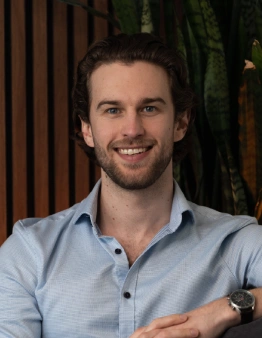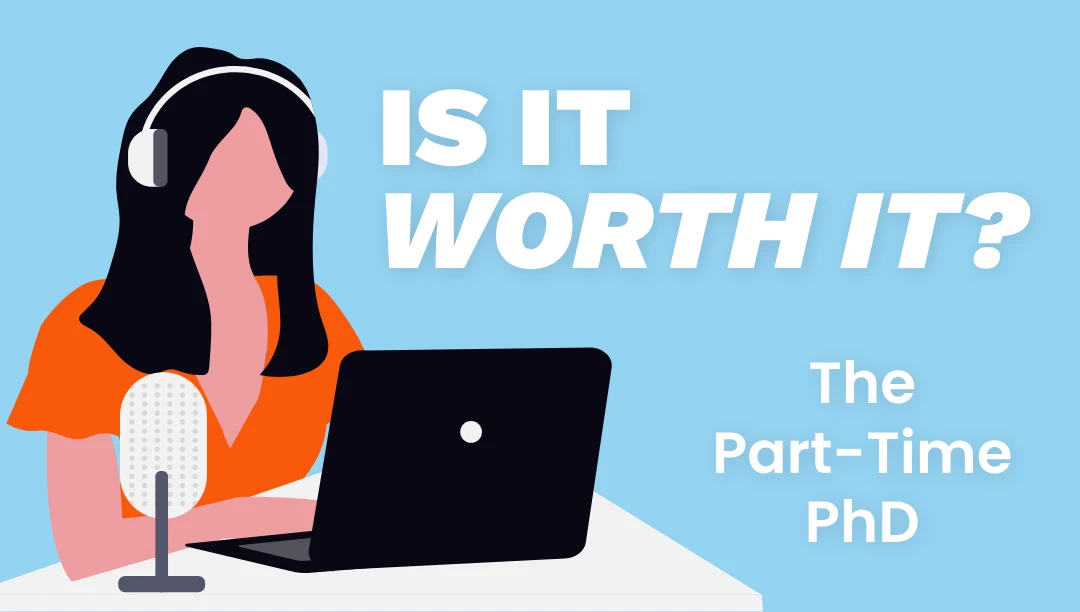Blog • Posted on Jul 19, 2025
Is a Part-Time PhD Worth It? Pros, Cons, and Alternatives
You’re ambitious. You’re juggling work, maybe family too. And yet, that dream of earning a PhD just won’t let go.
Sound familiar?
For many professionals, the idea of starting a PhD isn’t about diving headfirst into the ivory tower. It’s about continuing their real-world work while advancing their knowledge, credibility, or career. But between the time, cost, and mental toll, it’s fair to ask: Is a part-time PhD worth it?
In this article, we’ll break it down:
- What a part-time PhD really looks like
- The pros and cons most people don’t talk about
- When it is the right choice
- Alternatives that might be smarter (and kinder to your life)
Whether you’re in academia, government, business, or the non-profit sector, this article will help you make a grounded decision about your next steps.
Key Takeaways
- A part-time PhD can offer flexibility, job continuity, and integration with real-world work. But it’s not easier. Just slower.
- The long timeline, reduced academic immersion, and risk of burnout make motivation and support systems essential.
- It’s worth considering only if your career, research goals, and personal life align well with the slower pace.
- Alternatives like professional doctorates, targeted upskilling, or publishing without a PhD may offer more return for less sacrifice.
- Talking with a mentor before committing can help clarify your path and save years of uncertainty.
Table of Contents
What Is a Part-Time PhD?
A part-time PhD is a doctoral program designed to be completed alongside other professional or personal commitments. Most full-time PhDs take 3–4 years. A part-time PhD? You're looking at 6 to 8 years, sometimes longer.
These programs are often marketed toward working professionals or mid-career changers. You may be on campus less often (or not at all), with more flexible deadlines and supervision arrangements.
Some universities officially offer part-time tracks (especially in the UK, Australia, and parts of Europe). Others unofficially accommodate part-time students through informal agreements with supervisors.
But is it worth it?
Pros of a Part-Time PhD
1. You Can Keep Your Job (and Your Income)
Let’s face it: quitting your job to do a full-time PhD is a big financial risk. Especially if you’re mid-career, have a mortgage, or support a family. A part-time PhD lets you keep earning while you study.
This also keeps your career momentum going. You won’t need to “re-enter the workforce” in your 40s or 50s.
2. You’ll Have a Flexible Schedule
You may be able to structure your research around peak productivity times, work on it in evenings or weekends, or batch writing during quieter work periods.
Some universities offer remote supervision or hybrid models, making part-time study even more accessible.
By the way, if you struggle with paper writing, you can get daily tips straight from me to your inbox here (it's completely free).
3. Less Day-to-Day Pressure
With fewer deadlines and a longer timeline, many part-time students report feeling less daily stress (at least initially). There’s more room to pace yourself, take breaks, or handle life events without blowing your timeline.
4. You Can Align Work and Research
If your PhD topic complements your day job—think applied research in healthcare, policy, or education—you may be able to use workplace data or case studies. This can:
- Make your research more practical
- Provide access to real-world data
- Strengthen your professional profile
Some employers even fund part-time PhDs when they align with business or strategic priorities.
Cons of a Part-Time PhD
1. It Takes a Long Time
Most part-time PhDs take twice as long as full-time ones. That’s 6–8+ years of juggling.
Time alone isn’t the issue. What’s harder is:
- Maintaining motivation over the long haul
- Keeping your topic relevant as your field evolves
- Managing life changes (career moves, kids, burnout)
2. Harder to Maintain Focus
- Struggle to stay present with either job
- Lose momentum after work travel or crunch periods
- Feel constantly guilty for not doing enough
If this is you, read our guide to writing papers when you have no time.
3. Less Access to Academic Life
You may miss out on:
- Seminars and research groups
- Networking opportunities
- Informal mentoring
- Teaching opportunities
These are often the “invisible benefits” of PhD programs. Missing them can impact your learning, your sense of belonging, and even your post-PhD career trajectory.
4. Higher Dropout Risk
Part-time PhDs have higher non-completion rates. Why?
- Isolation
- Burnout
- Shifting priorities
- Poor supervision
You need strong internal motivation and external support to go the distance.
When a Part-Time PhD Is Worth It
A part-time PhD may be the right move if:
- You have a job you want to keep, and it aligns with your research
- You’re doing the PhD for personal or intellectual growth, not just career advancement
- You’re deeply self-motivated and already good at managing long-term goals
- You’re okay with it taking longer and life happening in the meantime
- You have support from your employer, supervisor, and family
Already there? Read our practical guide to doing a PhD while working.
When It’s Not the Best Fit
You might want to reconsider if:
- You want to finish quickly and move on
- You need immersive lab or field work
- You’re prone to procrastination or burnout
- You don’t have strong support systems
- You’re unsure about your topic or goals (this becomes costly over time)
Alternatives to a Part-Time PhD
If you’re feeling hesitant, you’re not alone. Many of our clients at RURU come to us after years of thinking about a PhD. But a PhD isn’t the only path to research, credibility, or impact.
Here are smart alternatives:
1. Take a Career Break for a Full-Time PhD
If you can access funding or save up, a full-time PhD lets you focus deeply for 3–4 years. You’ll finish faster, integrate into academic life, and (hopefully) avoid a long, drawn-out process.
Read our guide to choosing between full and part time here.
2. Consider a Professional Doctorate
Degrees like the EdD, DBA, or DClinPsy are often designed for professionals. They combine research and practice, often with a more structured format and shorter timeline.
Read Walden University's explaination of the difference between a PhD and professional doctorate
3. Pursue Targeted Upskilling
Instead of a 6-year research project, you could:
- Take short courses or microcredentials
- Learn a new method or framework
- Publish an article or whitepaper
- Build a portfolio of evidence-based work
This often gives you more return on effort, especially if your goal is promotion or thought leadership.
4. Do the Research Without the Degree
Want to explore a question, build a theory, or publish a book? You don’t need a PhD to do good research.
- Start a blog or Substack
- Publish in practitioner journals
- Pitch op-eds or articles to academic outlets
This is especially powerful if you’re already seen as an expert in your field.
5. Talk to a Mentor First
Before committing to a PhD, talk it through with someone who understands the academic world and the realities of your working life.

We Help Working PhDs Finish Faster & Publish More Through:
- 1-On-1 Mentoring - Real people. Real results.
- Professional Editing - Our team of expert editors will get your manuscript publication-ready.
- Online Courses - Learn invaluable presenting & writing skills.
A 30-minute conversation could save you years of wasted time or give you the confidence to finally begin.
FAQs
Can I work full-time and still do a part-time PhD?
Yes, many part-time PhD students work full-time. However, managing both requires strict time management, institutional support, and realistic expectations about your productivity and progress.
How long does a part-time PhD usually take?
A part-time PhD typically takes 6 to 8 years, depending on the country, university policies, and your personal circumstances. Some students take longer due to work or family commitments.
Will a part-time PhD hurt my academic job prospects?
Not necessarily. What matters most is the quality and impact of your research. That said, limited time for publishing, networking, and conferences can make it harder to compete for traditional academic roles.
Do part-time PhD students get the same supervision and resources as full-time students?
In theory, yes. But in practice, this varies widely by institution. Some part-time students report less access to supervisors or campus resources. It’s worth investigating and negotiating this upfront.
What are good alternatives to a part-time PhD?
Alternatives include professional doctorates, research-based Master’s degrees, online programs, or joining research collaborations without enrolling in a formal degree.
So, Is a Part-Time PhD Worth It?
Here’s the truth:
A part-time PhD can be worth it. But only if:
- The structure supports your life
- The motivation is aligned with your values
- You have the right systems and people around you
It’s not a shortcut. It’s not easier. But for the right person in the right circumstances, it can be transformative.
And if you’re not 100% sure? That’s okay. The world needs more thoughtful researchers (and fewer burnt-out ones).
Want support making the right call? Or maybe you're considering swithing to part time? We've helped researchers like yourself find their path and walk it with condifence. Explore our PhD mentoring plans
Dr. Matt Biddick is Founder & Mentor at RURU. You can book a free call with him here.


